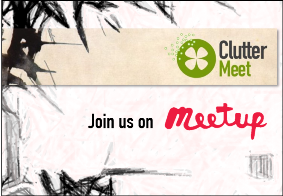The idea behind this new approach is simple: after the initial realisation that life has become cluttered in some way – be it on a physical or mental level – most people will be daunted by the prospect of actually doing something about it. Usually, this leads to flurries of activity each time it gets too much, only to end in the sinking feeling that nothing they do seems to make a permanent dent in the situation. The problem is that – once they get going – they quickly learn that whatever they start with is just the tip of an ever-growing iceberg of clutter that had been hidden underneath the surface of their awareness.
And ultimately, they give up. There are many reasons why this happens, but the most common ones are these:
All these are part of the protocol I have chosen for the ClutterMeet: a combination of activities to teach about the emotional background of clutter and practical ways to get started, to serve as a support network for the exchange of experiences with other participants, as well as a new challenge with each ClutterMeet that is intended to change the mind-set/understanding, but also to learn strategies that work, in a fun and intuitive way. At the end of the day, clutter accumulates because of habits we acquire over a lifetime. In order to address clutter, habits must be changed, and it stands to reason that this takes time and effort, too. And then we can finally deal with the physical fallout of those habits in our lives, the clutter. And be done with it properly. If this speaks to you, check out ClutterMeet (on the meetup website). If you know someone who struggles with this, please tell them about this! Comments are closed.
|
Ask the ClutterMeisterIdeas to help clear away the mess in your homes and in your minds.
Feel free to share any of my posts, but please put in a backlink to the original blog post. Thank you. The author
Hi, my name is Tilo Flache. My mission: help clients declutter mind and space.
This blog contains pointers for your journey towards a happier living experience. Archives
November 2023
|



 RSS Feed
RSS Feed




